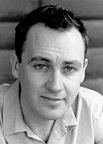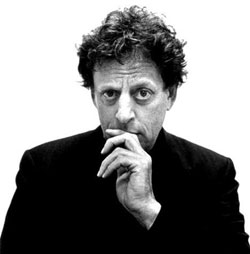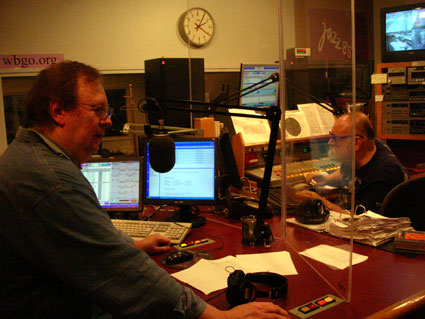The Prom Concert on August 10, given by the BBC Symphony, conducted by Edward Gardner, included two first performances, both of them commissioned by the BBC for this season of the Proms. These were among the 13 first performances and 7 UK first performances on the Proms this season.
 Michael Berkeley’s Slow Dawn is a revision and reorchestration of a work written three years ago for wind band, which had been commissioned by the British conductor and horn player Tim Reynish as a memorial piece for his son William. Berkeley intended it as a depiction of dawn in Wales where he lives, and follows the deliberate and inexorable tread of the sun from the first hints of light through its early appearance with to its full presence with stabbing rays of daylight. This sunrise is a long way from Daphnis and Chloe (or, for that matter, from Sibelius’s Night Ride and Sunrise, which preceded this piece on this program). Here the focus is on the tread of ‘the kind old sun’ (as Berkeley says, quoting Wilfred Owen) in its endless recurrence and its complete disregard for more transient human concerns. Starting with deliberate slow dirge rhythm in the percussion, which recurs periodically over the its course, the tonalish work builds, via lines which are increasingly quicker and more agitated, over a dense, very closely spaced harmonic texture to a violently rhythmic climax; it leaves a dramatic and satisfying impression.
Michael Berkeley’s Slow Dawn is a revision and reorchestration of a work written three years ago for wind band, which had been commissioned by the British conductor and horn player Tim Reynish as a memorial piece for his son William. Berkeley intended it as a depiction of dawn in Wales where he lives, and follows the deliberate and inexorable tread of the sun from the first hints of light through its early appearance with to its full presence with stabbing rays of daylight. This sunrise is a long way from Daphnis and Chloe (or, for that matter, from Sibelius’s Night Ride and Sunrise, which preceded this piece on this program). Here the focus is on the tread of ‘the kind old sun’ (as Berkeley says, quoting Wilfred Owen) in its endless recurrence and its complete disregard for more transient human concerns. Starting with deliberate slow dirge rhythm in the percussion, which recurs periodically over the its course, the tonalish work builds, via lines which are increasingly quicker and more agitated, over a dense, very closely spaced harmonic texture to a violently rhythmic climax; it leaves a dramatic and satisfying impression.
 Gaudete by Scottish composer Stuart MacRae is an almost half hour long piece for soprano and large orchestra, setting poems from the book of the same name by Ted Hughes. The piece begins with very arresting ferociously clattering music for the full orchestra which gradually clears to reveal the soprano singing stratospherically high without words. All of this is very effective and it all lands with something of a thud as soon as attention is turned to words, when the voice part, along with everything else, becomes labored and constricted, in terms of both rhythm and tempo.
Gaudete by Scottish composer Stuart MacRae is an almost half hour long piece for soprano and large orchestra, setting poems from the book of the same name by Ted Hughes. The piece begins with very arresting ferociously clattering music for the full orchestra which gradually clears to reveal the soprano singing stratospherically high without words. All of this is very effective and it all lands with something of a thud as soon as attention is turned to words, when the voice part, along with everything else, becomes labored and constricted, in terms of both rhythm and tempo.
This actually seemed to me to set the pattern for the piece, with instrumental music in what might be described as a high modernist style, managed in a very dramatically effective and masterly way, is cut short and undercut by vocal writing which is much less skillful, much less effective, and as a result, tends to come off much more as merely dealing in cliches of that same high modernist style, with endless jagged lines covering enormous registral stretches in jerky rhythms. At one point, when the text says “He never stops trying to dance, trying to sing,” when the singer launches into long melissmas of a sort of new music yodelling, one could imagine that the idea was to depict the failed effort described by the words, but the music is so much like all the rest of the voice part that it’s not possible to be completely sure whether that might be the composer’s intentions. It wasn’t clear to me exactly what the subject matter of the Hughes, as represented by the texts used or as discussed at some length in MacRae’s program notes, might be (and further rereading after the fact didn’t make things any clearer).
As the piece progressed I began to wish that MacRae had simply written a completely instrumental piece, somewhat shorter, that evoked whatever it was we were supposed to get out of the texts, and left the words out altogether. Had he done that, and had that meant leaving out the soprano (as opposed to having a wordless voice part, which could have been very effective), on the other hand, it would have been a loss, since it would have meant not having heard the really wonderful singing of Susanne Andersson, who always sang beautifully, and managed to make practically all the words comprehensible, despite all the obstacles MacRae had put in her path. (more…)

 Here’s a big loss to the New York new music community.
Here’s a big loss to the New York new music community. 
 n this age of Dobbsian-fueled immigration hysteria, what could be more timely than an opera about a beautiful Mexican drug smuggler who kills her lover after he betrays her and, in the process, becomes a folk heroine.
n this age of Dobbsian-fueled immigration hysteria, what could be more timely than an opera about a beautiful Mexican drug smuggler who kills her lover after he betrays her and, in the process, becomes a folk heroine.
